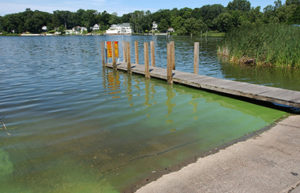This month’s News to Us covers wins for Michigan drinking water, national public lands, and flood mitigation but also some threats, including a harmful algal bloom in Ford Lake and contamination from coal-tar sealed parking lots and driveways.

Harmful algal bloom advisory reported in Ford Lake
The Washtenaw County Health Department and the Michigan Department of Health and Human Services issued an advisory for a harmful algal bloom on Ford Lake in Ypsilanti on August 6. The advisory urges residents and pets to avoid touching or swallowing any blue-green and scummy areas of the lake. Harmful algal blooms (HABs) are overgrowths of algae or bacteria in water that produce dangerous toxins, like microcystin, that can cause significant gastrointestinal problems.
Rules regulating PFAS contamination in Michigan drinking water now in effect
New regulation limiting seven PFAS chemicals in Michigan are now in effect. The rules set drinking water standards for the 2,7000 public water systems throughout the state. They also include guidelines for water testing, treatment, and public health advisories in the case of PFAS violations.
Billions for national parks as historic bill becomes law
In early August, President Trump signed the historic Great American Outdoors Act (GAOA) into law, allocating billions to improving and expanding America’s public lands and national parks. The law secures full funding for the Land and Water Conservation Fund, a program that uses royalties on fossil fuel operations to purchase new public lands and maintain public access. In addition, the GAOA establishes the National Parks and Public Land Legacy Restoration Fund to revive the $16 billion backlog of maintenance on pubic lands.
Source of dangerous Great Lakes contaminant could be coming from your driveway
A new USGS study of polycyclic aromatic hydrocarbons, or PAHs, reaffirms that coal-tar sealed driveways and parking lots are the main source of the contaminant across Great Lakes waterways. In the survey of 71 tributaries, 80% of sites indicated coal-tar sealed pavement was the most likely source of PAHs. PAHs are toxic carcinogens and pose a risk to aquatic and human health. However, alternatives to coal-tar-based sealants are available with 1,000 times lower PAH levels.
Biggest flood-mitigation project in Ann Arbor history now complete
In late July, the City of Ann Arbor completed its stormwater tunnel project at Argo Pond. Located just north of Depot Street underneath the railroad tracks in Ann Arbor, the project will reduce flood risk by 70 percent and improve stormwater management of Allens Creek, a tributary to the Huron River. The other part of the project, a pedestrian tunnel connecting the Border-to-Border Trail next to Argo Dam, is still under construction with completion anticipated for September.
Tree cover, urban sprawl both increased in Southeast Michigan over the past 30 years
As indicated by a new University of Michigan study, Southeast Michigan’s tree canopy and urban sprawl both increased between 1985 and 2015. The tree cover of the area expanded by 246 miles over the three decades largely due to maturing trees. Nonetheless, the researchers found that Southeast Michigan’s forested landscape has grown more fragmented as a result of urban sprawl.



